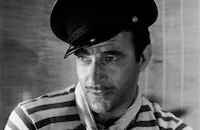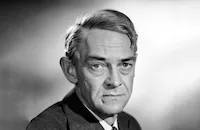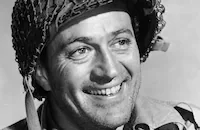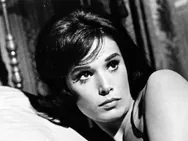Glory Alley

Brief Synopsis
Cast & Crew
Raoul Walsh
Ralph Meeker
Leslie Caron
Kurt Kaszner
Gilbert Roland
John Mcintire
Film Details
Technical Specs

Synopsis
As popular New Orleans-Times Picayune columnist Gabe Jordan is about to retire, he tells his successor, Dan, to find stories about real people, especially those on the section of Bourbon Street called "Glory Alley." Gabe then relates his greatest story: Boxer Socks Barbarosa has finally earned a shot at the title and is about to fight champion Terry Waulker when he suddenly bolts from the ring and runs to his dressing room. Socks' manager, Peppi Donnato, thinks Socks must be ill, but Socks angrily insists that he simply wants to give up the ring. When asked by his blind friend, the Judge, what his daughter Angie will think, Socks says she will understand, but accidentally knocks down the Judge. Later, in the deserted arena, Socks, who always wears a hat, is taunted by Waulker, whom he knocks out then recites a ten count.
As Socks walks the streets, he hears talk and reads headlines of his cowardice, then goes to see Angie at the Chez Bozo, the club where she dances. Angie loves Socks but does not understand why he decided to quit the ring so abruptly. Socks then goes to the Punch Bowl bar to apologize to the Judge, but the Judge, a former jeweler, rebukes Socks, saying that he is just a flawed diamond. Peppi, who is more understanding, says that he is buying the Punch Bowl and wants Socks to be his partner. Socks declines, even though Peppi gives him the contract to his other fighter, Newsboy Addams. One morning, a hung-over Socks is awakened by Sal "The Pig" Nichols, a local boss who wants him to have Newsboy throw a fight. Socks refuses and later accepts Peppi's offer to become a relief bartender.
Soon Socks begins selling tickets to a raffle, which offers a turkey and Newsboy's contract as the grand prize. Pig, who has bought a number of the tickets, wins the raffle, and is infuriated when Socks reports that Newsboy's contract is worthless, as he has been drafted. When Socks tells Angie that he, too, is going into the Army, she pledges to wait for him. In Korea, Socks becomes an excellent soldier and is awarded the Congressional Medal of Honor. When Socks returns to New Orleans, he is hailed as a hero by everyone except the Judge, who orders him to stay away from Angie. Although she agrees to keep seeing Socks in secret, Angie says that she cannot leave her dependent father. For the next few weeks, Socks enjoys being a local hero, but soon the accolades fade and he becomes so embittered that he almost returns his medal. Socks tells Peppi that he would like to open his own bar but cannot get a lease without giving Pig a ten percent cut. A short time later, as the Judge is sitting in the Punch Bowl, he is approached by noted Milwaukee eye surgeon Dr. Robert Ardley. Although not promising a definite cure, Ardley, who is lecturing in New Orleans, asks the Judge to come see him. The Judge is suspicious, and insists that he has no money for an operation, but Ardley says that at his clinic he only takes patients who cannot pay.
The next day, the Judge and his friend, Shadow Johnson, visit Ardley, and the Judge says that he wants the operation, even though there is only a fifty-fifty chance of success. When they run into Socks in the doctor's building, the Judge is suspicious, and when he later discovers that Socks is from Milwaukee, he angrily confronts him. Socks denies arranging the operation, but Peppi confirms it, and the Judge denounces Socks as "a gutter rat." Now even Angie cannot forgive her father, and reveals that the money they live on is not from a legacy from her Belgian grandfather but her earnings at the Chez Bozo. Although shattered because he had thought that Angie worked nights at a hospital, he secretly goes to see her perform. Outside the club, Socks tells Pig he will give him a ten percent cut of the bar for his help in securing a lease, but Pig knocks him down and calls Socks a welsher. Just then, Shadow arrives, saying that the Judge will have the eye surgery After the operation, Ardley goes to say goodbye to the Judge because he has to return to Milwaukee.
The Judge promises to pay him, but Ardley refuses, saying that Socks has taken care of it and for years has anonymously sent money to the clinic. Ardley also relates that, years ago, his father had sewn fifty-nine stitches in Socks's head after Socks's brutish father murdered his mother and left Socks for dead. That night, when Angie and Socks meet, he tells her what happened to him as a child and relates that it was the bright lights of the arena that made him flee before the championship bout. Because other children had taunted him for his head scars, he secretly feared that everyone would see the still visible scars and ridicule him. Angie tenderly assures him that there is no reason to be ashamed and he only needs the courage to take off his hat.
Some time later, the Judge returns to the Punch Bowl, although the operation was not a success, he says that, thanks to Socks, he will never really be blind again. When Socks comes into the bar, not wearing his hat, he sees the Judge smiling and embraces Angie. With his story now complete, Gabe reveals that Socks returned to boxing and won the championship after only eight fights. Gabe and Dan then go to the Punch Bowl, where Peppi, Socks, the Judge and Angie are enjoying one another's company.

Director

Raoul Walsh
Cast

Ralph Meeker

Leslie Caron
Kurt Kaszner

Gilbert Roland

John Mcintire

Louis Armstrong
Jack Teagarden
Dan Seymour

Larry Gates
Pat Goldin
John Indrisano
Mickey Little
Dick Simmons
Pat Valentino
David Mcmahon
George Garver

Larry Keating
Phil Tead
Eve Whitney
Joan Barton

Joy Lansing
Erin Selwyn
Beryl Mccutcheon
Sammy Schack
Joe Gray
Larry Anzalone
Herbert Lytton
John Pickard

Don Haggerty
Steve Roberts
Jonathan Cott
John Damler
Patrick Conway
Frank Arnold
Louis Mercier
Carl Harbaugh
Max Willenz
Paul Bryar
Leo Cleary
Teddy Pavelec

King Donovan
Bill Baldwin
Marietta Elliott
Audrey Saunders
Gloria Stone

Barrie Chase
Jack Perry
Kit Guard
James O'gatty
Charles Sullivan
Suzy Greene
Bert Keyes
Carl Sklover
Crew
Peter Ballbusch
Ray Bauduc
Malcolm Brown
Art Cohn
Mack David
Joel Freeman
Cedric Gibbons
A. Arnold Gillespie
Keogh Gleason
Bob Haggart
W. C. Handy
John Indrisano
Gilbert Kay
Robert Lee
Jay Livingston
Nicholas Nayfack
Warren Newcombe
Charles O'curran
Willard Robison
Helen Rose
Arthur Rosenstein
Gene Ruggiero
Pete Rugolo
Douglas Shearer
Georgie Stoll
Joseph Wolf Warfield
Edwin B. Willis

Videos
Movie Clip




Film Details
Technical Specs

Articles
Glory Alley
Louis Armstrong, affectionately nicknamed Satchmo, was born in New Orleans on August 4, 1901. For years, publicity bios listed his birth date as July 4, 1900. But in 1983, twelve years after Armstrong's 1971 death, his baptismal record surfaced, listing the 1901 birth date. Still, no matter the date, with Armstrong was born a musical revolution. Considered the most influential jazz musician in history, Armstrong spent his childhood in poverty and discovered at an early age that he could earn a nickel singing on street corners. But Satchmo's big musical break (so legendary that it's taken as fact whether it's true or not) came on December 31, 1912, when Armstrong fired off a gun in celebration of the new year. A nearby cop was not amused and Armstrong spent the next year and a half in a boys' home.
While serving his time, Armstrong joined the prison's band, first as a singer, then moving quickly through roles as a percussionist and bugler, before finally settling on the coronet. He continued playing upon his release in 1914, using borrowed instruments until he could afford his own horn. Still, his sound caught the ear of Joe "King" Oliver, one of New Orleans' jazz masters, who took Armstrong under his wing and became his coach and mentor. A few years later, in 1922, Oliver would invite Armstrong to play coronet with his band in Chicago. From that point on there was no looking back for Satchmo. He made his first recordings in 1923 as a member of King Oliver's Creole Jazz Band and took on the Big Apple in 1924, signing on to play with the Fletcher Henderson Orchestra at the Roseland Ballroom. In 1925 Armstrong recorded for the first time as the leader of his own group called Louis Armstrong and His Hot Five.
Pretty soon, Armstrong was a sensation, playing on Broadway, touring the country and, in 1931, appearing with his band in the film Ex-Flame. The next year Armstrong and the band would make a surprise appearance in the Betty Boop cartoon, I'll Be Glad When You're Dead You Rascal You. Armstrong also set out on a European tour in 1932, where a London magazine editor first used the name Satchmo. The nickname, bestowed by fellow musicians, was originally Satchel Mouth. But the shortened version caught on, and followed Armstrong the rest of his career. His grave in Flushing, New York, even bears the nickname Satchmo.
Armstrong appeared in over thirty films, including Cabin in the Sky(1943) with director Vincente Minnelli and two memorable movies with Bing Crosby, 1936's Pennies from Heaven (Armstrong's first speaking role) and High Society (1956). Glory Alley fell towards the middle of Armstrong's movie career, showcasing his musical talent but giving him a bare-bones character to play. Many of Armstrong's film roles simply called for the musician to play himself in movies like Young Man with a Horn (1950) and The Glenn Miller Story (1954). But it was, perhaps, his rendition of a Broadway song that brought Armstrong his greatest film success. His recording of the title song from the musical Hello Dolly was such a big hit that Armstrong was written into the 1969 film adaptation. Though he shared little on-screen time with Barbra Streisand, Hello Dolly was a fitting cap on Armstrong's movie career and the song became one of his signature pieces. The same year he sang the theme song to On Her Majesty's Secret Service, a James Bond spy thriller starring George Lazenby as secret agent 007.
Producer: Nicholas Nayfack
Director: Raoul Walsh
Screenplay: Art Cohn
Art Direction: Malcolm Brown, Cedric Gibbons
Cinematography: William H. Daniels
Costume Design: Helen Rose
Film Editing: Gene Ruggiero
Original Music: George Stoll
Principal Cast: Ralph Meeker (Socks Barbarrosa), Leslie Caron (Angela Evans), Kurt Kasznar (The Judge), Gilbert Roland (Peppi Donato), John McIntire (Gabe Jordan), Larry Gates (Dr. Ardley), Jack Teagarden (Himself).
BW-80m. Closed captioning.
by Stephanie Thames

Glory Alley
Quotes
Trivia
Notes
In the opening credits, Louis Armstrong's credit reads: "Louis (Satchmo) Armstrong and His Trumpet." The character played by Leslie Caron is listed in the onscreen credits as "Angela," but in the film she is only called "Angie." Although the Hollywood Reporter review of Glory Alley listed a running time of 84 minutes, this was probably an error as all other reviews and copyright materials list a running time of either 78 or 79 minutes. According to a Hollywood Reporter news item, actor Jeff Richard was assigned a top role in the picture, but he did not appear. Actor Larry Keating is seen briefly in a scene in the "Punch Bowl," but has no dialogue and his role, listed as "Philip Louis Bennson" on the CBCS, was apparently cut before the film was released. Actors Jack Gargan and Emile Meyer, listed respectively as "President Truman" and "General" on the CBCS, were also cut from the film. According to a March 12, 1952 Hollywood Reporter "Rambling Reporter" item, the sequence featuring Gargan showed the president awarding "Socks Barbarosa" his Congressional Medal of Honor. Although Socks speaks about the event, the scene was not in the released film.
Other Hollywood Reporter news items include actor Tommy Walker and dancer Marilyn Russell in the "Jolie Jacqueline" number, but their appearance in the released film has not been confirmed. An unidentified, but contemporary newspaper item noted that George Hormel II, scion of the Hormel meat-packing family and husband of Caron, was to be seen as a patron in the "Chez Bozo," but his appearance has not been confirmed. Glory Alley marked the first onscreen singing role for Caron, and the first film that Raoul Walsh directed at M-G-M since 1935's Baby Face Harrington (see AFI Catalog of Feature Films, 1931-40). In addition Armstrong's numbers in the released film, another song, "It's a Most Unusual Day," by Jimmy McHugh and Harold Adamson was recorded by cut. That number, plus several songs from the film were included in a CD-anthology album entitled "Now You Has Jazz: Louis Armstrong at M-G-M," released in 1997.














